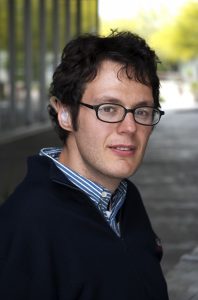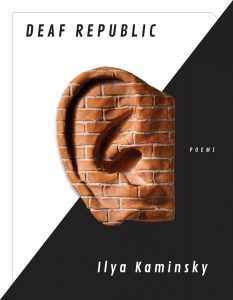
 Deaf Republic emerges from a confession. “We Lived Happily during the War,” a narrator admits in the title of the opening poem, the first of poet Ilya Kaminsky’s long-awaited collection. The book’s cardinal, double-edged metaphor is this: After an occupying soldier executes a deaf boy at a protest, the entire country is rendered deaf. Is it an act of defiance? Is it the only way to live, as a way of life collapses?
Deaf Republic emerges from a confession. “We Lived Happily during the War,” a narrator admits in the title of the opening poem, the first of poet Ilya Kaminsky’s long-awaited collection. The book’s cardinal, double-edged metaphor is this: After an occupying soldier executes a deaf boy at a protest, the entire country is rendered deaf. Is it an act of defiance? Is it the only way to live, as a way of life collapses?
The author of the Dorset Prize-winning book Dancing In Odessa, Kaminsky grew up in the former Soviet Union and lost most of his hearing at the age of 4. Escaping religious persecution, his family immigrated to the United States when they were granted political asylum in 1993. After the death of his father one year later, Kaminsky began writing poems in English — a language he has never clearly heard.
In a 2018 interview with Edward Clifford for The Massachusetts Review, Kaminsky described writing in his second language as “a parallel reality, an insanely beautiful freedom.”
“There is a beauty in falling in love with a language — the strangeness of its sounds, the awe of watching the sea-surf of a new syntax beating again and again the cement of your unknowing,” he told Clifford. For Kaminsky, the “miracle of metaphor” is full of possibility.
An editor, translator and globally feted poet, Kaminsky will give his Chautauqua Literary and Scientific Circle Author Presentation on Deaf Republic at 3:30 p.m. Thursday, July 25 in the Hall of Philosophy. In a week dedicated to “The Life of the Spoken World,” Kaminsky’s presentation is one of many poetry-centric literary arts events, including the book launch for Speak a Powerful Magic, an anthology of 10 years of Traveling Stanzas, as well as two respective Brown Bag craft lectures from poets Shara McCallum and Abraham Smith.
Atom Atkinson, director of literary arts, noted how the unique perspective of Deaf Republic and its author provides a fresh window through which to experience this other programming.
“The world has been waiting for another book by Ilya Kaminsky for a while, and I am part of that world,” they said. “As a poet, and as someone who is of the poetry world, I am especially interested in thinking about how poetry books don’t just illustrate that poetry can be resonant with the content that we’re discussing, either during a week or during a season or in the world at that time, but also can be a whole other way into thinking and feeling that can only happen through poetry. It becomes a book very much about asking the reader, especially hearing readers, to reconsider what silence is, what we mean by that when we say it.”
Deaf Republic unfolds into a poetic parable of oppression and resistance; its lyric poems follow the townspeople of Vasenka as they enact a refusal to hear. There is Alfonso and Sonya, newlyweds and gifted puppeteers, and their child Anushka. There is Galya Armolinskaya and her girls, who orchestrate an insurrection against the invading forces in sign language and seduction.
“You see what it means to live in a dangerous world, or a dying world, as human beings,” said Sony Ton-Aime, Wick Poetry fellow and self-described Kaminsky “fanboy.”
It is nearly impossible, according to Ton-Aime, to exist outside one’s “cocoon,” in order to write about the world. But he said that Kaminsky sees “the world as it is, without the fear of being in it, without the fear of dying — but all of those (fears) are there.”
“In (Deaf Republic), you still fall in love,” Ton-Aime said. “You still struggle in the human things, but the world around you is crumbling and you’re going down. To face falling in love in a dying world would be senseless. Why would I have children, why would I bring them into this world? The only reason I think that is because I cannot face this world. But he’s facing it.”
Kaminsky is “not a documentary poet” but “a fabulist,” he told Clifford.
“And, yet, the world pushes through, the reality is everywhere in this fable,” he said. “My job is to make this border between the shelter of fable and the bombardment of reality a lyric moment, I feel.”
In the interview, Kaminsky characterizes the United States as “currently harassing/bombing/taking advantage of more than half of this Earth’s population.” He considers himself an American poet, but prefers another label.
“What is my American experience?” he asked Clifford. “It is laughing with my friends, to making love to my girlfriend, fighting with my family, loving my family, loving the ocean (I love water), loving to travel on train, loving this human speech. But we all have these things, don’t we? Yes, we do. And therefore, I fiercely resist being pigeonholed as a ‘Russian poet’ or ‘immigrant poet’ or even ‘American poet.’ I am a human being. It is a marvelous thing to be.”




